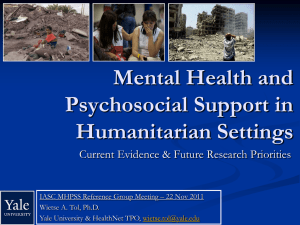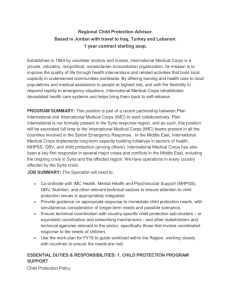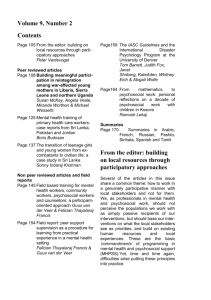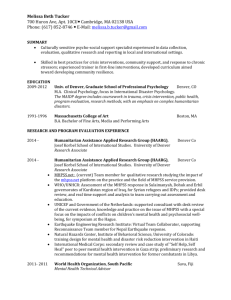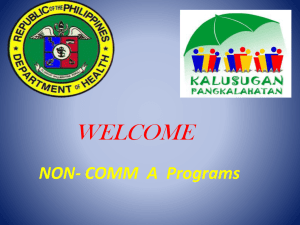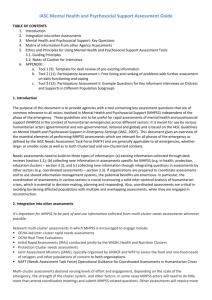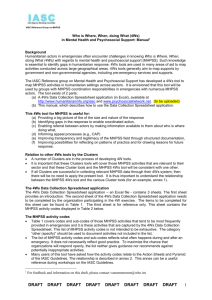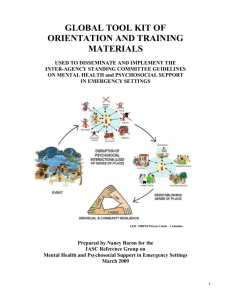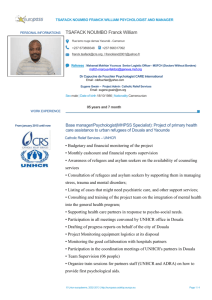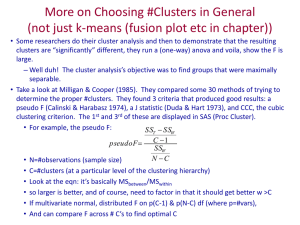TOR_MHPSS_WG _ESAMAR_ENDORSED23.04.2014docx 2
advertisement
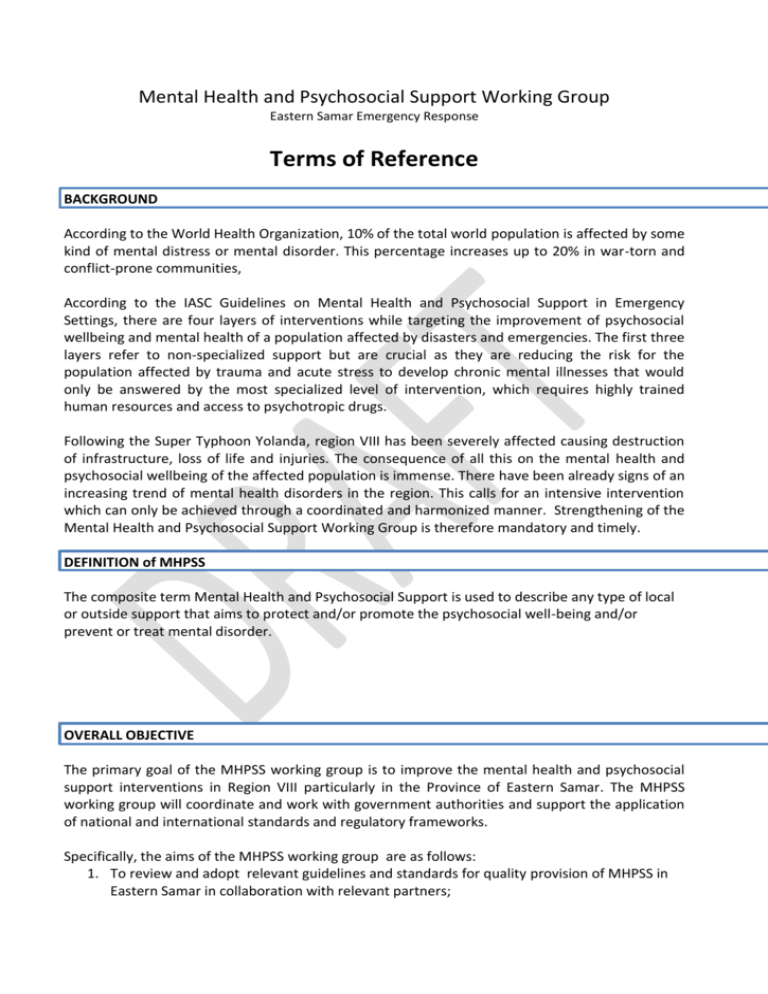
Mental Health and Psychosocial Support Working Group Eastern Samar Emergency Response Terms of Reference BACKGROUND According to the World Health Organization, 10% of the total world population is affected by some kind of mental distress or mental disorder. This percentage increases up to 20% in war-torn and conflict-prone communities, According to the IASC Guidelines on Mental Health and Psychosocial Support in Emergency Settings, there are four layers of interventions while targeting the improvement of psychosocial wellbeing and mental health of a population affected by disasters and emergencies. The first three layers refer to non-specialized support but are crucial as they are reducing the risk for the population affected by trauma and acute stress to develop chronic mental illnesses that would only be answered by the most specialized level of intervention, which requires highly trained human resources and access to psychotropic drugs. Following the Super Typhoon Yolanda, region VIII has been severely affected causing destruction of infrastructure, loss of life and injuries. The consequence of all this on the mental health and psychosocial wellbeing of the affected population is immense. There have been already signs of an increasing trend of mental health disorders in the region. This calls for an intensive intervention which can only be achieved through a coordinated and harmonized manner. Strengthening of the Mental Health and Psychosocial Support Working Group is therefore mandatory and timely. DEFINITION of MHPSS The composite term Mental Health and Psychosocial Support is used to describe any type of local or outside support that aims to protect and/or promote the psychosocial well-being and/or prevent or treat mental disorder. OVERALL OBJECTIVE The primary goal of the MHPSS working group is to improve the mental health and psychosocial support interventions in Region VIII particularly in the Province of Eastern Samar. The MHPSS working group will coordinate and work with government authorities and support the application of national and international standards and regulatory frameworks. Specifically, the aims of the MHPSS working group are as follows: 1. To review and adopt relevant guidelines and standards for quality provision of MHPSS in Eastern Samar in collaboration with relevant partners; 2. To provide a forum for sharing of information on activities of local and international organizations providing MHPSS services. To maintain an updated 4 Ws matrix on who is doing what and where and when, including target population and specific responses; 3. To support the development and dissemination of key information and advocacy messages on MHPSS to the relevant Clusters and sub cluster working groups and the affected population, as needed; 4. To support the collection, and dissemination of data for purposes of joint planning, monitoring, evaluation, and advocacy of MHPSS activities 5. To build the capacity of relevant service providers, especially government counterparts, to comply to the guidelines and standards 6. To foster collaboration and coordination amongst agencies and diverse stakeholders (government agencies professional societies and communities); 7. To promote and support the use and full implementation of the IASC guidelines on MHPSS in Emergency Settings; and ensure smooth transition to early reconvery phase; MEMBERSHIP of MHPSS working group Membership for Eastern Samar MHPSS WG is open for all agencies working on MHPSS in the Province and includes government agencies, UN agencies, INGOs, and national/local NGOs with active MHPSS programmes and activities. Members are focal persons representing their organization’s activities in MHPSS and are expected to regularly and actively participate into the WG. The following members are expected to regularly share information on MHPSS activities within the WG 1. Provincial Health Office 2. Provincial Social Welfare and Development 3. Department of Education , Eastern Samar 4. Provincial Health Team Office – Department of Health 5. PNP 6. MSF 7. UNICEF 8. UNFPA 9. WHO 10. Plan International 11. Health Futures Incorporated 12. HOM 13. And any other interested agencies LEADERSHIP The MHPSS working group will be chaired by the Provincial Health Office and co-chaired by the Department of Education and technical advisory from World Health Organization. The coordinating agencies will be responsible to ensure the smooth running of the MHPSS working group and support the field by designing effective MHPSS guidelines and standards, and provide technical support to relevant stakeholders. MHPSS working Group MEETINGS The working group will meet every two weeks (the First and Third WEDNESDAY, of the month at 11:00 AM at Provincial Health Office), during its inception phase and then will move to monthly and subsequently quarterly meetings if deemed needed and approved by working group members. A draft agenda will be circulated to members of the working group at least five days before the regular meeting, giving the members the opportunity to suggest additional points for discussion. Draft minutes shall be circulated within one week before the meeting date. The minutes will then be circulated to relevant working groups (Health/Education/ProtectionCPWG/GBVSC) PRINCIPLES The work of the Eastern Samar MHPSS working group will be guided by the following principles: 1. CONFIDENTIALITY, ensuring that identified patients/or those in need of MHPSS services, their families and information sources are protected. 2. SAFETY, all actors will prioritize the safety of the beneficiaries at all times. 3. RESPECT, actions and responses of all actors will be guided by respect for the personal choices, wishes, rights, and the dignity of the beneficiaries. 4. NEUTRALITY, a non-partisan approach in providing services 5. IMPARTIALITY, non-discrimination on the basis of nationality, race, ethnicity, religion, political views, age, sexual orientation, gender, social, and other status. 6. PARTICIPATORY APPROACH, ensuring to the extent possible, consultation with all members of the community in MHPSS activities/programs 7. INDEPENDENCE, working without influence of states, government bodies, parties to a conflict, or other political entities. 8. EQUITY AND ACCESS REPORTING The MHPSS WG will provide feedback to the Protection, Education and Health Clusters through the respective representatives of the clusters. The MHPSS WG is therefore part of the Protection, Education and Health Clusters, tasked with the responsibility to provide relevant MHPSS information and recommendations for inclusion in the overall health, education and protection strategy. The MHPSS WG shall keep the Clusters informed of its activities and strategies and the chairs will liaise to ensure complementarities of the two working groups. The MHPSS working group shall closely link up with other working groups in the Protection and Health Cluster such as Child Protection Working Group, and Gender Based Violence Sub Cluster in areas of common interest. The chairs of the MHPSS WG shall participate in all Protection and Health Cluster meetings and provide feedback on main Intercluster developments. RESPONSIBILITIES and KEY ACTIVITIES of the MHPSS working group Like the MHPSS working group of Region VIII, the MHPSS working group in Eastern Samar serves as the reference body for coordination, guidelines development, technical advice, and oversight of MHPSS services in the Province I. Improving Coordination and Information Sharing a. Conduct regular mapping of the 4Ws in all of the key communities related to MHPSS; b. Develop and maintain a training information matrix; c. Regularly identify and document key achievements, best practices, lessons learned, and other information on effective mechanism to provide MHPSS, and utilize the information for future planning and programming; d. Ensure coordination with other protection groups, working groups, and subclusters, and; e. Update the MHPSS terms of reference, as needed. II. Developing Information Systems a. Support safe and confidential collection of MHPSS data, ; b. Distribute regular and consistent reports to all stakeholders to keep them informed about the nature and extent of MHPSS and how it is being addressed. III. Mainstreaming of MHPSS into other clusters/sectors a. Regular/ad hoc participation to relevant cluster meetings to represent specific MHPSS concerns as appropriate, and; b. Enhance the participation of other clusters in the MHPSS cluster IV. Building Capacity of Local MHPSS Providers a. In collaboration with other clusters and experts, support the capacity building of relevant stakeholders and service providers; b. In collaboration with other clusters and experts, support the development, implementation, and monitoring of a referral pathway to ensure prompt and appropriate MHPSS services c. Work with partners to develop and/or revise MHPSS materials according to local context; and d. Support the enrolment of partners into MHPSS related courses and learning programs. e. All products (e.g. referral pathways, information management frameworks etc) of the working group as they are being developed and advanced are agreed upon and adhered to by all partners AMENDMENTS The Terms of Reference is a working document and may be altered to meet the current needs of all members by agreement of the majority of the members. Unless there’s a specific request from members to make amendments, this Terms of Reference shall be reviewed quarterly to reaffirm responsibilities and commitment of the cluster members.
